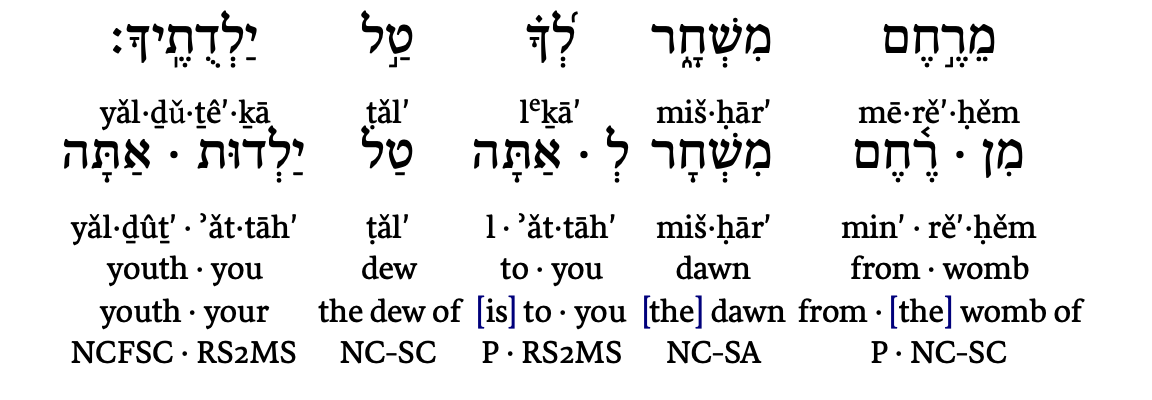Psalm 110:3 (LEB)
Your people ⌊will volunteer⌋ in the day of your power.
In holy splendor, from the womb of the dawn,
you will have the dew of your youth.
(The LEB translator note for "will volunteer" is "Literally “will be freewill offerings”; see the related verbal form in Judg 5:2")
The OP, for some inexplicable reason, cites only translations of translations in the original question, which is why "childhood" - ילדות, yaldut (noun), from "yeled" or child - is mistranslated in those secondary translations as "begotten" (which is the hifil verb הוֹלִיד or holid). All English translations working directly from the Hebrew translate this as childhood or youth.

Psalms are poetry and use poetic language, that is metaphor - there is not an actual "womb of the dawn" just as there is not an actual "dew of youth" :)
Rather, the dew of youth is the doctrine or teaching that comes from God to the youth (the ones instructed) like the dew that comes each day at daybreak.
Deuteronomy 32:2 (LEB)
May my teaching trickle like the dew,
my words like rain showers on tender grass,
and like spring showers on new growth.
Notice that the dew falls on "tender" (young) grass and on "new" (young) growth. That is, the teaching is given to the young. And just as the dew, or rains, cause the plants to grow, so the teaching causes the youth to mature and grow in understanding and wisdom. But the tender grass needs more than dew, it also needs light, and thus our next metaphor:
The womb of dawn is the source of the dawn. Why is the word "womb" used in this poetic way? Other than considerations of sound and meter, "womb" - רחם is a pun on "mercy" which has the same consonants but with different pointing. It is God's mercies that are renewed every dawn [Lamentations 3.22]. The origin of the daybreak is God, as God is light, but it is also a reference to God's mercy in creating the light, this parallels the dew, which is God's mercy on the land. Both the dawn and dew are parallels in that they are metaphors for the gaining of understanding as well for that which is necessary for the plants to grow.
Luke 2:52 (KJV 1900)
52 And Jesus increased in wisdom and stature, and in favour with God
and man.
Therefore this verse alludes to God's doctrine, or teaching, being mercifully given to Messiah in his youth, similar to the dew being given to the ground at dawn.
